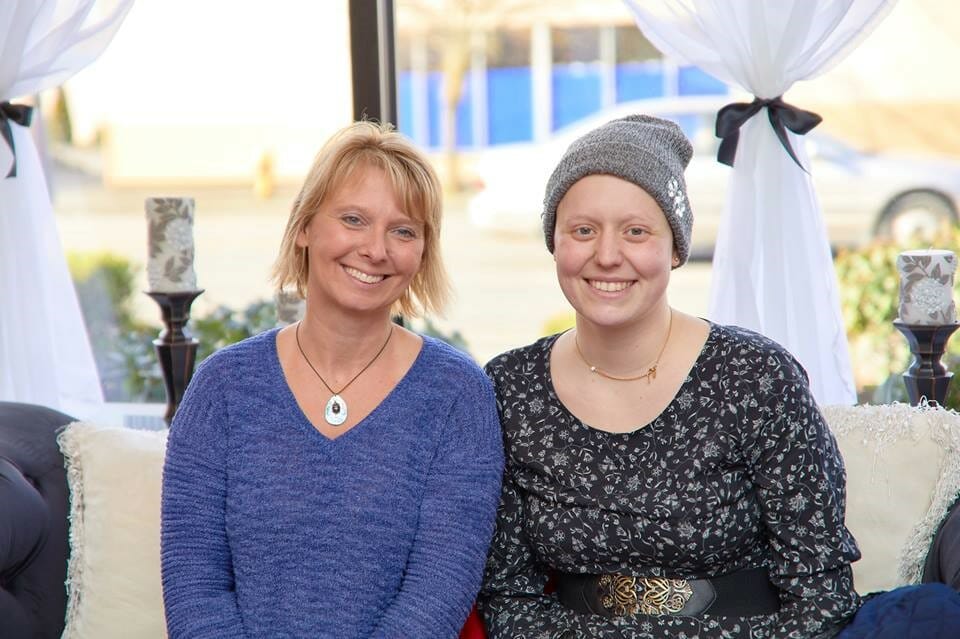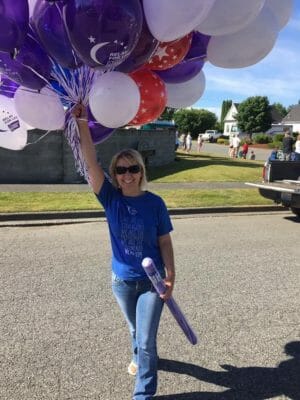Washington Woman Supports Cancer Survivors

There were an estimated 2 million new cases of cancer diagnosed in the United States last year, according to the National Institute of Health – more than the entire population of Philadelphia. As widespread as the disease is, a cancer diagnosis can be incredibly isolating: studies have found that 23 percent of cancer patients lack support from family and friends during their treatment, and nearly 20 percent of people living with cancer have lost touch with their family and friends as a direct result of their diagnosis.
Monique Brigham is deeply aware of the impact that cancer can have on relationships and communities, having lost numerous friends and loved ones to the disease and knowing many others who are survivors. Inspired by the positive impact of the American Cancer Society, she joined the planning committee of Relay for Life of Skagit County. At the time, the community, just north of Seattle, had almost forgotten about the event, so Monique set out to revive the Relay, creating a space for the community to come together, celebrate, and remember.
Since becoming the event lead three years ago, Monique has revitalized Relay for Life of Skagit County, nearly doubling participation and donations. For her work raising funds and awareness for cancer, Monique is today’s Daily Point of Light Award honoree. Points of Light spoke with her to learn more about her commitment to service.
This interview has been lightly edited for clarity.
What inspires you to volunteer?
I’ve lost a lot of people to cancer. I showed up at our first Relay for Life that I attended, and the numbers were down. People just weren’t coming, and they didn’t know about it anymore. I had just lost two friends to cancer that year. I’ve also seen the good work that the American Cancer Society is doing. My uncle is a survivor, he’s 80 years old and he’s been cancer free for two years now. I see the difference that they’re making, and it inspired me to not let the Relay for Life die in our community and do something about it.
I learned exactly what our money goes for, and I ended up becoming a volunteer driver [with Road to Recovery, an American Cancer Society program offering free rides to treatment for qualifying cancer patients] as well, because I can’t imagine going through cancer treatment and then trying to figure out how to get myself to treatment.

Describe the Relay for Life event.
It’s a camp out at one of our local high schools. It’s a fun festival where people walk the track. We start out by honoring our cancer survivors with a celebration, and they walk a lap of the track by themselves and caregivers walk with them. We have veterans and first responders walking after that. Then we have different laps for different hours. We’ve got live music, lots of food – all kinds of fun community engagement. At 10:00 p.m., we have a Remembrance Ceremony where we light paper luminaria bags that have been decorated in honor and memory of people who have died from cancer or are survivors. We light the luminaria and have a ceremony – a song or a speaker, usually – and then we walk the track together with lit candles and remember the people that we’ve lost and why we’re walking. We walk through the night and have a few different things going on overnight, to motivate people to be there [laughs]. The music stays on all night, and we’ve got movies that play for the kids – the ones who want to be diehards and stay up all night.
We have a breakfast in the morning. This year it will be a Father’s Day breakfast, and we’ll have a Dad and I lap, because [the relay will be on] Father’s Day. Afterwards, we have a Fight Back ceremony, where we have an inspiring speaker and talk about the good work that’s being done to fight back against cancer.
How many Relays for Life have you organized?
This is the third that I’ve been the lead on. Because it had kind of gotten forgotten about in our community, we decided to find different unique ways to get the community involved. We have outreach, where we’ll go to a festival street fair and have our booth set up with information on cancer and pamphlets that say, “You’ve been diagnosed with cancer, now what?” We get people in touch with people that can give them support, get them rides to treatment and teach them that there’s more to your diagnosis than “Okay, so you’re sick.”
Are there any upcoming events that you’re looking forward to?
We have a couple of really fun kid events. Next month, we have an illuminated Easter egg hunt. It goes from 6:00 p.m. to 9:00 p.m., so it’s kids of all ages – we have four different times, for little kids on up to 18 year olds. We also have a Halloween party. That one isn’t a fundraiser, it’s basically just for fun. Come, have fun, hang out and learn more about Relay for Life.
One of my favorite events is a spa day. Spero Skin and Spa [a local salon] does a spa day, where they treat cancer survivors to a spa day. The survivors get scalp massages, facials, chair massages, and – if they have hair – they get hair treatment. It’s just one of the most special things. That individual event has probably been the most special thing that I’ve done, because of the survivors. They sit and they talk, and they tell their stories. I have a picture of a mom and her daughter, and their both cancer survivors. The daughter’s probably in her 50’s or 60’s, and they’re holding hands. That kind of stuff, it’s just “wow.”
You also volunteer as a driver with Road to Recovery.
Yeah, that is one of the rewarding things that we do. When I first started relaying, I didn’t know anything about the mission. I just thought the money went to research. Then I learned about this [American Cancer Society] Road to Recovery program. When a patient is diagnosed with cancer, they get some money for shuttles to and from treatment, or they have some taxis that will take them, and I hear that there were several patients being turned down because they didn’t have enough drivers and they didn’t have enough funds, so they have this volunteer program. Can you imagine going to your treatment and coming out, and your ride is gone because the taxi driver just couldn’t wait any longer?
So, we have a bunch of volunteers around the area that sign up to drive people. I drive here in my county, because we have a small community, and in Bellingham, which is just north of us. I have my own schedule, so I can drive and listen to the patients’ stories. One lady told me all about traveling all over the country in one of those old silver Airstream trailers. Last year we gave 197 rides in our county paid for from Relay for Life funds. I don’t know the numbers of who was turned down for rides, because there weren’t enough volunteers or enough funds, but it was quite a bit. So, I have some work to do [laughs].
What have you learned from your experiences as a volunteer?
That everybody’s story is different, and that cancer affects almost everybody in some way, shape, or form. I was working on some banners for our [Relay for Life] campsite, just our team names, why we are walking. I’m probably going to have to make two banners, one for the names of people in memory of and one in honor of people that are survivors, because my team is sending me new names every single day, of somebody that’s been diagnosed or somebody that they’ve lost.
Do these events help build a community of cancer survivors?
Yes, they do. And then you have people that come to surround them, and reach out and let them know that they’re not alone, that there’s people here for them.
Why do you think it’s important for others to give back?
Because there’s so much more out there than just us, you know? It’s just more rewarding when you give back.
What do you want people to learn from your story as a volunteer?
I want them to learn that there’s hope for people that have been diagnosed with cancer. It might be hard, but there’s people there that are helping them to get through it. There’s people that are cheering them on. People hear the words, “I’ve got cancer,” and it’s just hopeless. They feel alone. I don’t want anybody to feel like that.
Do you want to make a difference in your community like Monique? Click here to find local volunteer opportunities.
